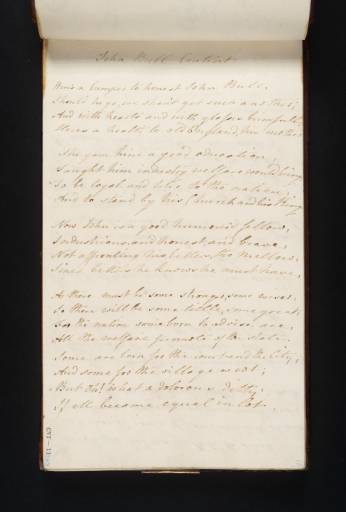The poem begun on this leaf is continued on the verso and folio 12 of the sketchbook (
D07146–D07147). For convenience it is given in full here:
Here’s a bumper to honest John Bull
Should he go, we shan’t get such another;
And with hearts and with glasses brimful
Here’s health to Old England, his mother
She gave him a good education,
Taught him industry welfare would bring
To be loyal and true to the nation
And to stand by his church and his King
Now John is a good humour’d fellow
Industrious, and honest, and brave
Not affronting his betters, tho’ mellow
Since betters he knows he must have
As there must be some stronger, some wiser
So there will be some little, some great
For the nation some born to advise are
All the welfare promote of the State
Some are born for the Court and the City
And some for the village or cot
But oh! What a dolorous ditty
If all became equal in lot
[continued on verso]
If our ships had no pilots to steer
What would come of poor Jack in the shrouds
If our troops no commander would hear
They would soon be armed robbers in crowds
Then the plough and the loom would stand still
If they made us gentlemen all
If ploughmen were all who would fill
The parliament, pulpit, and hall
Rights of man, make a very fine sound
Equal riches, a plausible tale
But whose labour would then till the ground?
All would drink, but who’d brew the best ale?
If half naked half starved in the streets
We were wand’ring about sans culottes
Would equality furnish us meat?
Or would liberty lengthen our coats?
[continued on folio 12]
Now blest is a merciful King
So well guarded by juries and laws
We amidst our employments may sing
The true blessings of liberty’s cause
Then perish whatever may tend
To confusion, and riot, and blood
On his virtues John Bull may depend
To be happy as long as he’s good
Of these stanzas Finberg noted ‘the handwriting may not be Turner’s’ (it is certainly exceptionally neat for him) but there is another version of them, in his hand in pencil, inside the front cover of the later
Yorkshire 5 sketchbook (Tate
D40860; Turner Bequest CXLVIII). At least one of these transcriptions must be an instance of what Andrew Wilton has described as Turner’s ‘occasional drafting of a poem by another writer as if it were his own, with rephrasings and alterations [that resemble] spontaneous composition’.
1 A longer version, anonymous and simply titled ‘Song’, had appeared with other ‘Select Modern Poetry’ in
The Gentleman’s Magazine, February 1805 (p.158); it was to be sung to the tune ‘Why Moses, why Aaron’ and with a chorus, ‘Here’s health to right honest John Bull’ after each verse. This may in turn be associated with the play
John Bull by George Colman the younger, 1803, or with lines sometimes attributed to the poet William Cowper but not acknowledged by him.
David Blayney Brown
July 2010

